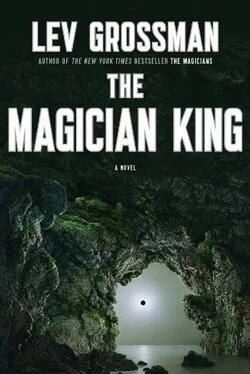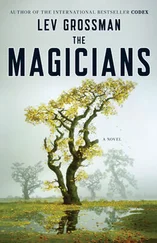After a week the wind died, but the sky was clear, and in the afternoons and evenings Admiral Lacker raised the light-sail, and they ran along on the strength of a storm of sunshine. Quentin had been to the far west of Fillory, when he hunted the White Stag over the Western Sea, but the far east was a very different place. It had a polar quality. The sun was bright and hot here, but the air was getting colder. Even in the mornings, when the sun seemed dangerously close, like it was going to light the mast on fire, they could see their breath. The blue of the sky was deep and vivid. It felt like Quentin could fall up into it if he wasn’t careful.
The water was an icy aquamarine, and the Muntjac slipped through it almost frictionlessly, barely leaving a ripple. It was different stuff from ordinary seawater — silkier and less dense, with almost no surface tension, more like rubbing alcohol. Only one kind of fish lived in it, long silvery bullets that flashed and dashed through the water in diamond-shaped schools. They caught a few, but they didn’t look edible. They had huge eyes, and no mouths, and their flesh was bright white and smelled like ammonia.
The world around them began to feel thin. It was nothing Quentin could put his finger on, but the material of reality itself seemed to be getting sheer and fragile, stretched taut over its frame. You could feel the chill of the outer dark right through it. They all caught themselves moving slowly and gently, as if they might put a foot through the fabric of space-time by accident.
The sea was getting shallower too. You could see the bottom through the glassy water, and every morning when Quentin checked it, it was closer. This was an interesting phenomenon from an oceanographic point of view, but more to the point it was a problem. The Muntjac wasn’t a big ship, but it still drew twenty feet or so, and at this rate they were going to run aground long before they got to wherever the hell they were going.
“Maybe Fillory doesn’t have an End,” Quentin said one night, as they were tucking into their increasingly meager and unappetizing rations.
“What, like it’s infinite?” Josh said. “Or it’s a sphere, like Earth? God, I hope it’s not that. What if we end up back at Whitespire again? Man, I’ll be pissed if all we’ve done is find the Northwest Passage or whatever after all that.”
He licked his fingers, getting the extra salt from a salt biscuit. He was the only one who didn’t seem overawed by the situation.
“I meant more like a Möbius strip. What if it’s all one side, and no edge?”
“I think you mean a Klein bottle,” Poppy said. “A Möbius strip still has edges. Or one edge.”
“You mean a Klein bottle,” Julia confirmed.
Nothing like having a demi-goddess around to settle an argument. Julia didn’t eat anymore, but she still sat at dinner with them.
“Is it a Klein bottle? Do you know?”
Julia shook her head.
“I don’t know. I don’t think so.”
“So you’re not omniscient?” Eliot said. “I don’t mean that in a bad way. But you don’t know for sure?”
“No,” Julia said. “But I know this world has an End.”
They all woke up early the next morning when the Muntjac ran aground.
It wasn’t like they hit a wall. It was more gradual: a distant grinding sound, gentle at first, then louder, and then suddenly urgent, bone on bone, ending with everything on board, people included, slewing gently but firmly into the nearest forward wall as the ship came to a complete stop. And then, ringing silence.
They all came up on deck in their robes and pajamas to see what had happened.
The stillness was uncanny. All around them the sea was flat and glassy as a coat of fresh varnish. No wind blew. A fish jumped, maybe a quarter-mile away, and it sounded as loud as if it were right next to them. The sails hung slack. The slightest vibration sent circular ripples gliding away toward the horizon in all directions.
“Well,” Eliot said, “that tears it. What do we do now?”
It crossed Quentin’s mind, as it had presumably crossed that of the crew, that they had long ago passed the halfway point of their supplies. If they couldn’t go forward they would die on the way back. Or just die here, marooned in a desert of water.
“I will speak to the ship,” Julia said.
As she had even when she was still human, Julia meant what she said and said what she meant. She went down to the hold, to the heart of the ship, where the clockwork was, knelt down, and began to whisper, stopping now and then to listen. It wasn’t a long conversation. After four or five minutes, she patted the thick base of the Muntjac ’s mast and stood up.
“It is settled.”
It wasn’t immediately clear what had been settled, or how, but it became apparent. They floated free of the bottom and began gliding forward again as if nothing had happened. Quentin only figured it out when he happened to look back at their wake. Enormous old planks and beams and other assorted carpentry were bobbing and turning in the water behind them. The Muntjac was making herself smaller, rebuilding herself from the keel up and discarding the extra wood as she went. She was giving up her body for them.
Quentin’s eyes smarted. He didn’t know what sort of being the Muntjac was, whether it had feelings or whether it was just some kind of mechanism, an artificial intelligence constructed out of rope and wood, but he felt a surge of gratitude and sadness. They’d asked so much of it already.
“Thank you, old girl,” he said, just in case it, or she, could hear him. He patted the worn railing. “You’ve saved us one more time.”
The shallower the ocean got the more the Muntjac had to alter herself. Quentin told the crew to bring up the sloth, who permitted herself to be slung from a yard, blinking and yawning in the open air. They emptied the cabins and the hold and piled up everything around them on deck.
Banging and groaning sounds came from below, deep in the ship’s guts. Quentin watched as first the Muntjac ’s high, proud stern dropped into the water, then its bowsprit and its entire forecastle. At around four o’clock in the afternoon the mizzenmast toppled over into the water with a huge splash and was lost astern. The foremast went that evening. They slept on deck that night, shivering under blankets in the chill.
In the morning when they woke up the sea was shallow enough to wade in, and the Muntjac had become a flat single-masted raft. Its hull was completely gone; only the deck was left. The ocean mirrored the cloudless dawn light, making an infinite plain of smoky rose. When the sun boiled up over the horizon it was immense — you could see its corona curling around its bright, unbearable face.
At noon they ran aground again — the front edge of the raft crunched to a stop on the sandy bottom. That was it; the Muntjac was going no farther. She had nothing more to give.
But by now they could see that their journey did in fact have a destination. A low, dark line had materialized out of the distance, running the full width of the horizon. It was impossible to guess how far away it was.
“Looks like we’ll have to walk,” Quentin said.
One by one Quentin, Eliot, Josh, Julia, and Poppy swung over the side and dropped into the water. It was cold but shallow, not even kneedeep.
They had already set off when they heard a splash behind them. Bingle had climbed over the railing — he was coming too. Evidently he did not consider his bodyguarding duties fully discharged. And Abigail the Sloth: he was carrying her piggyback, her long arms around his neck like a fur wrap, her claws hooked together in front of him.
Читать дальше












